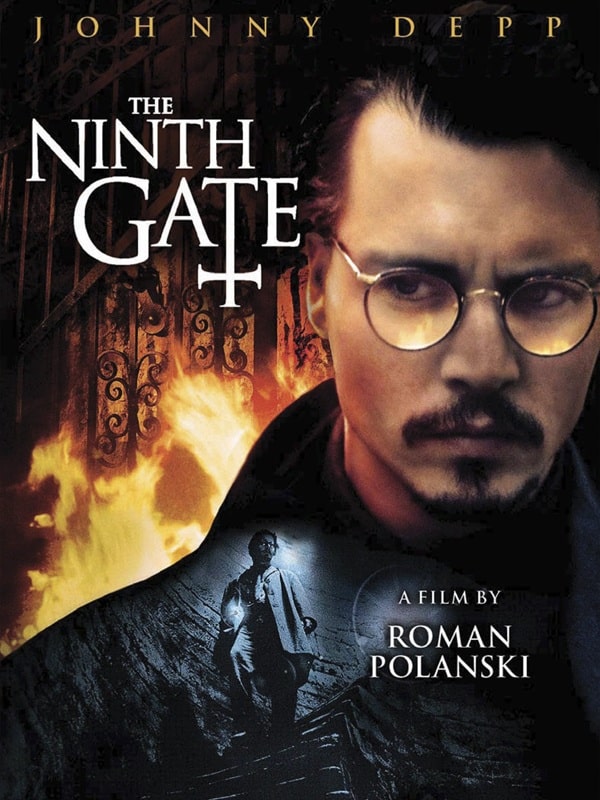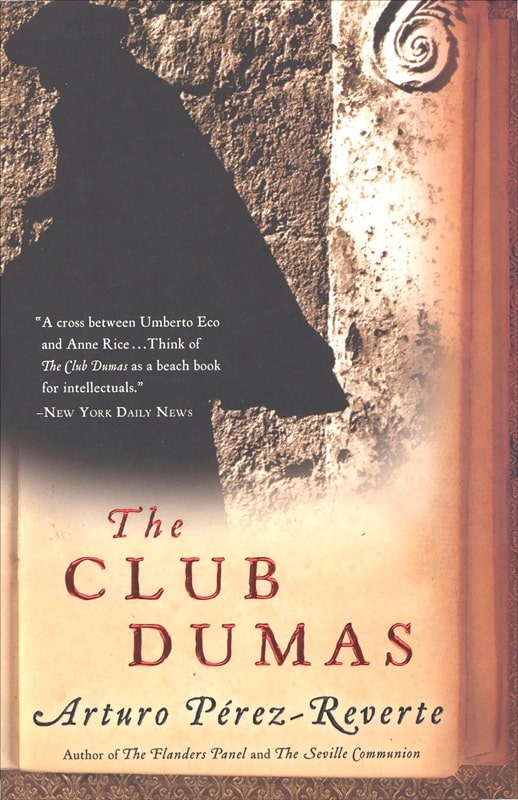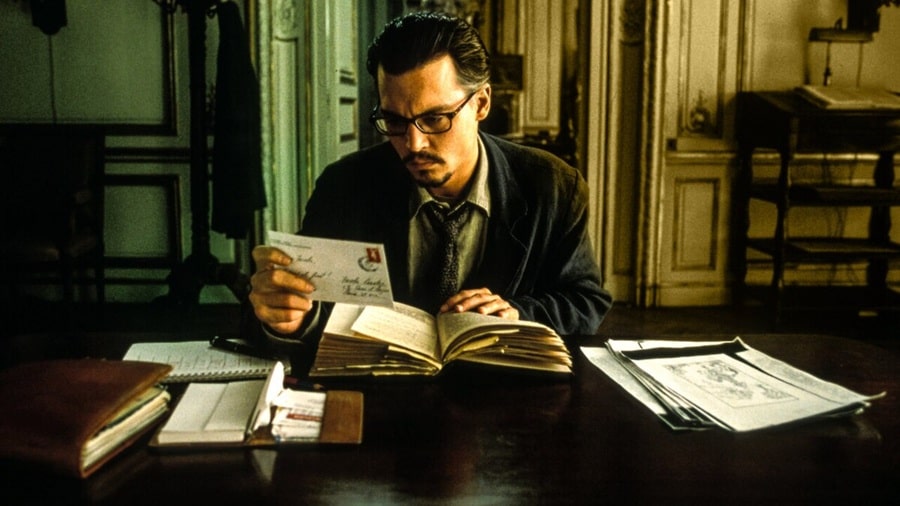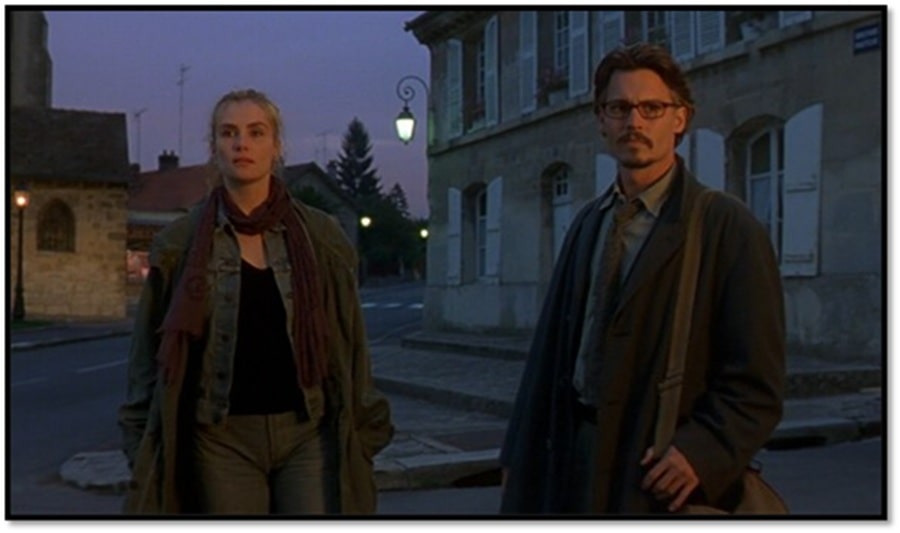Goth Chick News: (Another) Throwback Thursday – Johnny Depp, Roman Polanski, and The Club Dumas

Last week’s article on Angel Heart not only resulted in a lot of fun and insightful comments from all of you, but it got me thinking about another film that I appreciate in a similar way. It will be twenty-six years old next month and having given it a re-watch last weekend, I wondered what your thoughts would be on this one.
The Ninth Gate, directed by Roman Polanski and starring Johnny Depp, was released in March 1999. Polanski was co-writer on the screenplay which was loosely (and I do mean loosely) adapted from the book, The Club Dumas (1993) by Arturo Pérez-Reverte.

In the film, Dean Corso (Depp) is a New York book dealer with a reputation for unscrupulous methods. When Boris Balkan (Frank Langella), a wealthy collector of rare books on the occult, hires him to authenticate a mysterious tome called The Nine Gates of the Kingdom of Shadows, Corso embarks on a journey across Europe.
The book, rumored to summon the devil when used correctly, exists in three copies, but only one is authentic. Corso’s task is to examine the three editions and uncover the truth. As Corso delves deeper into his investigation, strange deaths and supernatural occurrences begin to haunt his steps. Along the way, he is joined by a mysterious woman (Emmanuelle Seigner), whose true nature seems tied to the book’s sinister secrets.
In parallel with Angel Heart, The Ninth Gate presents a dark journey into the unknown by a skeptical protagonist who is in over his head but doesn’t know it. The memorable visuals created by Darius Khondji, who is known for his work on Se7en, are well synchronized with the puzzle elements of the story and Polanski’s signature direction is evident as well. From dusty bookstores to candlelit castles, the cinematography oozes occult suspense all over the place.
I frankly love The Ninth Gate all the way up until its final few moments.
[Minor spoilers ahead.]
The film does a fabulous slow burn to what can only be described as an enigmatic conclusion, and this is why Angel Heart is still my favorite of the two films. While we aren’t at all confused as to what will become of Harry Angel, The Ninth Gate leaves viewers in the maddening position of wondering whether Dean Corso has unlocked forbidden knowledge, become ensnared in a deadly conspiracy, or gone to literal Hell – maybe all three. I remember screaming “NO!” at the screen when the credits rolled since all the fabulous creepiness that built through the entire film, simply went off a cliff at the very end, without resolution.

That sent me straight to the source material to see if Polanski was being a jerk by leaving us with such an unsatisfactory conclusion. I immediately went out and bought a copy of The Club Dumas assuming that it would fill in some, if not all, of the missing pieces.
Nope.
While The Ninth Gate is based on The Club Dumas, it omits substantial portions of the novel, particularly a subplot about a lost chapter of The Three Musketeers. The film focuses solely on the occult storyline, which, by the way, is a sub, SUB plot of the book. If anything, the ending of the book was even more obtuse, with themes centered on literary puzzles and human obsession rather than a definitive supernatural climax.
Interestingly, the titular tome at the center of the film, called De Umbrarum Regni Novem Portis, or The Nine Gates of the Kingdom of Shadows, is a fictional text. Its design plays a significant role in the plot, with eerie and violent illustrations which are gruesomely brought to life in the form of the demise of several characters. The engravings within The Nine Gates book, which were painstakingly designed for the film, serve as the visual centerpiece of the story. Each engraving contains subtle differences across the editions, forming cryptic clues for Corso and the audience to unravel. For movie prop collectors, it is a highly recognizable and sought-after addition.

I used to have visions of owning my own copy of The Nine Gates, however, a well-made replica with a leather cover can go for upwards of $1200 or more. If you’re interested in a more attainable version, an engineer named Michael F. Haspil has created a detailed tutorial including the printable text and illustrations you’ll need to build one yourself, which you can find here.
Ultimately, The Ninth Gate received mixed reviews at the box office and made a rather crappy $58M against a $38M budget – so basically a bomb by Hollywood standards. Though critics praised its style, it was criticized for its pacing and lack of resolution. Despite that, The Ninth Gate has aged well with viewers like me who enjoy slow-burning mysteries and subtle horror. Depp delivers a restrained performance, grounding the fantastical story in a world of skepticism and pragmatism, while Frank Langella’s portrayal of Boris Balkan adds recognizable vice as a man consumed by his quest for power, at the peril of his soul.
The Ninth Gate’s blend of literary intrigue and supernatural tension makes it a film that (mostly) stands up over time. Whether you’re a fan of Polanski’s work, a lover of occult mysteries, or simply curious about the interplay between literature and cinema, The Ninth Gate is worth revisiting.
Thoughts?
I have a copy of this book but haven’t read it. Maybe now’s the time. I can attest that Pérez-Reverte writes brilliantly literate and entertaining historical swashbucklers, namely his Captain Alatriste series, set in golden age Spain; I can’t recommend them too highly.
Yes!!! Alatriste is AWESOME!!!
“The Flanders Panel” is also really good. I’m in the middle of reading that right now.
KJes – I just looked up “The Flanders Panel” and I’m sold. I’m all over that one too. Thank you for the recommendation.
TPark, thank you for the recommendation. I’m going to try Alastriste when I’m on holiday next month. I can’t really say I liked The Club Dumas. The writing style wasn’t the issue, it was the story.
“The Club Dumas” was my introduction to Perez-Reverte’s novels, and I’ve gone on to read and enjoy several more of his books. It’s a pity he’s not better known to English language readers.
“
I enjoyed “The Ninth Gate”, but it’s not a patch on the source.
MC: I’d definitely going to give his other stuff a go.
My complaints with the film are twofold:
1. These are priceless rare antique books AND CORSO IS SMOKING AROUND THEM CONSTANTLY?
2. If the movie ended when CORSO revisits the book shop and gains his last clue, THAT would have been a much stronger ending rather than the one we got. Leaving the decision in Corso’s (& the audience’s) hands without resolution would be an ending far more memorable than the meh-pocalyptic one Polanski put to it.
The book is an old favorite I enjoy separately as I’m a big bibliophile so Club Dumas hit my sweet spot.
The movie truly is just taking the B-subplot and moving that to center stage. That lets me divorce it from its source and lament that clumsy ending and blame Polanski for keeping us about 5 minutes longer than necessary.
S2: I, too, was horrified by the smoking. It’s Polanski’s way of showing that Corso doesn’t really give a crap about the books. When the Baroness told him he couldn’t smoke I was relieved that this wasn’t just some oversite of characterization. And SO much truth about the ending. I usually just stop the movie right where you said.
I never saw the film or read the book but I do remember both from back in the day. I can’t help but think that there’s a surface resemblance to Clark Ashton Smith’s “Return of the Sorcerer ” albeit minus the pulp.
Your comments remind me of Ray Bradbury’s observation that you can have a flawed film with a great ending that ends up salvaging it all as a pretty good movie while an otherwise great movie with a bad ending is just a bad movie. I’d amend that thought and say that sometimes the hopes and expectations we viewers bring to a movie can bestow upon it a sentimental glow that (in our minds at least) leaves us with a more favorable assessment than the movie warrants and that’s OK. Sometimes we just need to cut ourselves and the stuff we like a little slack.
B – Any day I can remind someone of Ray Bradbury is a good day indeed. Well stated.